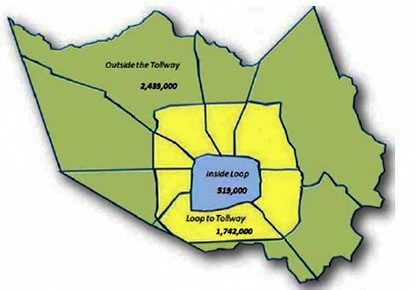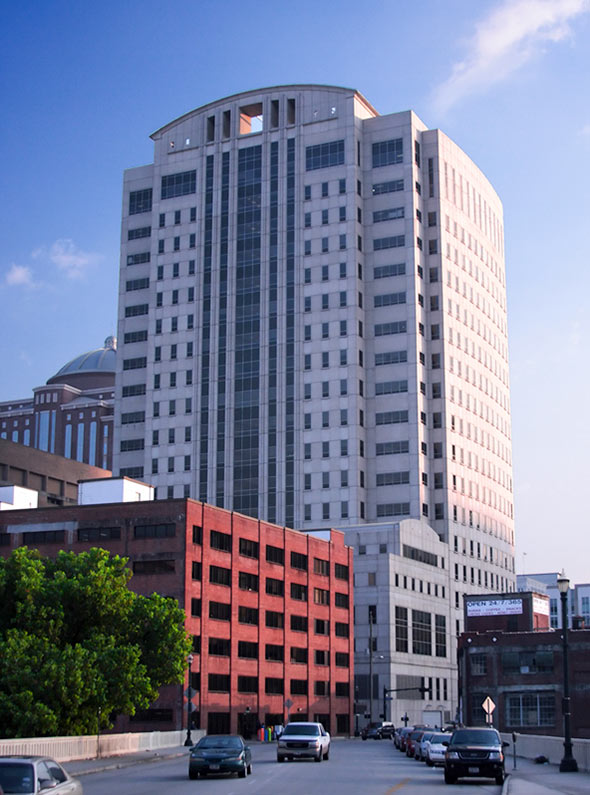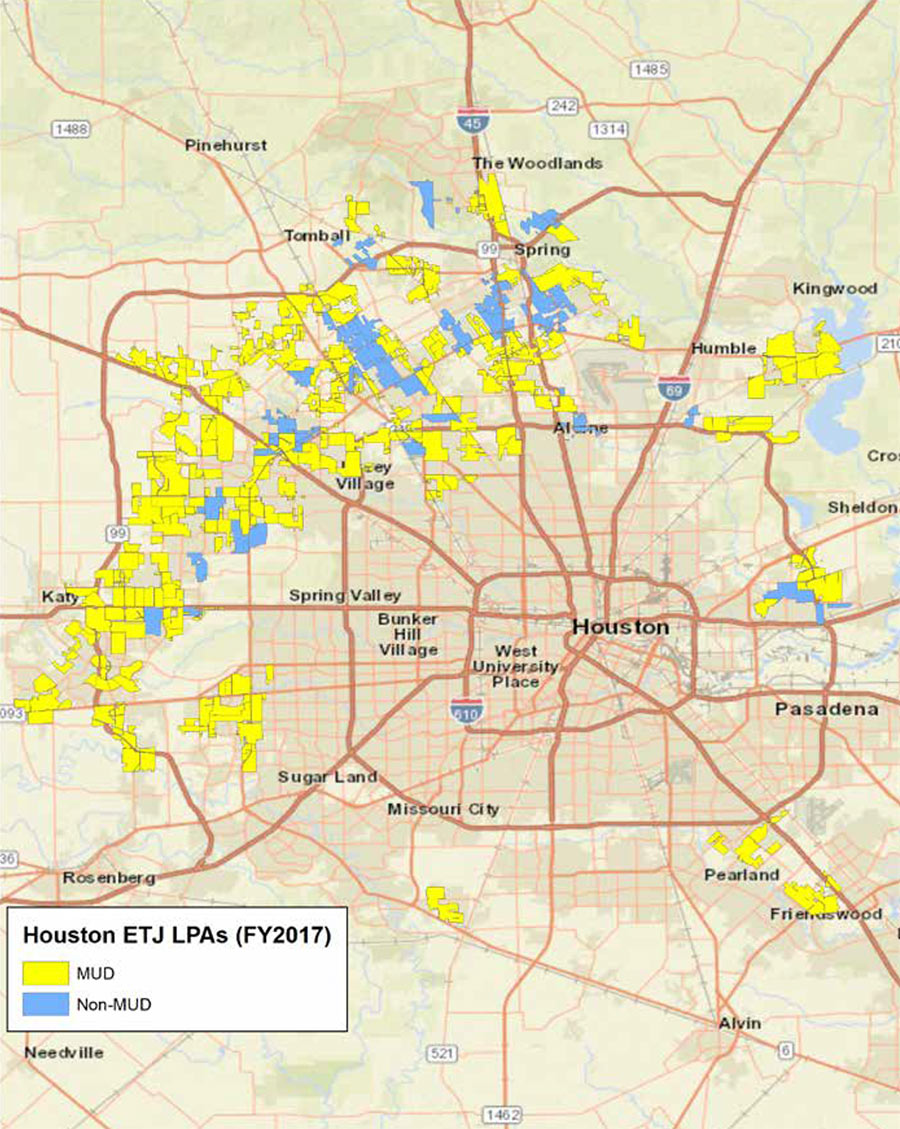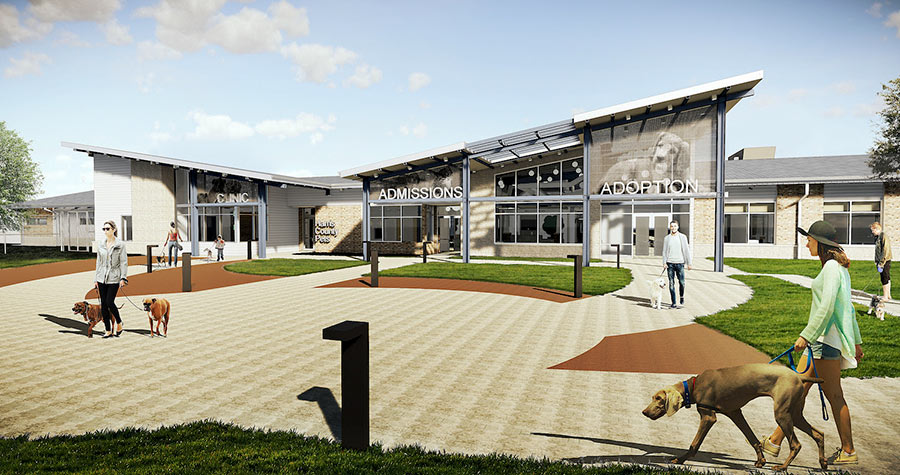THE ASTONISHING RISE OF UNINCORPORATED HARRIS COUNTY  You already knew that more people in Harris County live outside Beltway 8 than inside it, right? And that of the people residing inside the Beltway, fewer than a quarter live inside the Loop? Here’s another nugget contained in the latest Harris County population report: the population of Harris County’s unincorporated areas will likely surpass that of Houston in 2020. That’s right: for 16 years, more than 80 percent of the growth in Harris County has taken place outside of the city limits of Houston and the 34 other cities that make up the county. Already, says the report, “‘Harris County Unincorporated’ would be the second largest city in Texas, the fifth largest in the U.S. and has a larger population than 14 U.S. states.” [Harris County Budget Management Department via Houston Chronicle] Map of populations inside and outside of ring roads: Harris County Population Report – January 2017
You already knew that more people in Harris County live outside Beltway 8 than inside it, right? And that of the people residing inside the Beltway, fewer than a quarter live inside the Loop? Here’s another nugget contained in the latest Harris County population report: the population of Harris County’s unincorporated areas will likely surpass that of Houston in 2020. That’s right: for 16 years, more than 80 percent of the growth in Harris County has taken place outside of the city limits of Houston and the 34 other cities that make up the county. Already, says the report, “‘Harris County Unincorporated’ would be the second largest city in Texas, the fifth largest in the U.S. and has a larger population than 14 U.S. states.” [Harris County Budget Management Department via Houston Chronicle] Map of populations inside and outside of ring roads: Harris County Population Report – January 2017





This is absolutely nuts. All this area with no municipal government, just a bunch of unaccountable MUDS running wild. The county can’t pass ordinances so the flood prone sprawl continues unabated, all works while these areas are fresh and new and people want to be there. What about once the houses get run down and they are no longer ‘desirable’, this is going to be a disaster with no larger body to rescue and revitalise and invest in these areas. All the people who live in these areas rely on Houston if Houston and the economic activity it generates didn’t exist this whole area would be nothing but swampy prairie. Yet you bring up that these areas should be incorporated into the city and everyone screams that the city is trying to steal their tax dollars (unspoken is that their real problem is that the city funds projects for all people in all areas, not just the privileged suburb they are in) when it is really them who profit by day from the city and its economic engine but then drive home utilizing the hideously expensive taxpayer funded freeways built for their benefit (that city people pay for too) so they can avoid giving any money to said city and actually contributing. Merge Harris county and the city of Houston into one entity, including all the villages, bellaire and west u that exist purely so rich people can sponge off the city but not give back to it. River oaks manages to exist within city limits without being flooded by the poor masses so I’m sure they can too without losing their ‘character’.
Harris County would function and look aesthetically better if it was all divided up into competing incorporated townships ala Dallas County. All of them try to outdo each other as their local town governing bodies can put greater pinpoint emphasis on reinvesting/revitalizing in their declining areas, creating a better quality of life and better infrastructure for its citizens. Having the City of Houston annexing all unincorporated Harris County would mean services would be stretched far too wide and too thin, becoming even more unreliable. Hell I live near downtown and can’t even get the city to pick up my heavy trash, regular trash or recycling some weeks!
@ RG: Just so you know, most large tracts of land within the City of Houston are built out, but when new development does happen, the City requires the developers to create a MUD inside the City. Residents of in-city MUDs do not get a tax break on their City taxes, so they end up paying substantially (and sometimes egregiously) more for the same utilities and other municipal services as most other City constituents, and that is in addition to having another political entity that few understand or are even aware of.
.
Also, the City doesn’t fund very much freeway construction at all. That comes mostly from the State and Federal governments, which are of course funded by the entire region and beyond — which is as it should be, because both urban and suburban stakeholders use freeways and rely upon them for freight and access to labor.
.
I agree with the main thrust of your argument, that regionalism makes for a more effective and more equitable approach to governance, but I also think that if you got what you’re asking for that the City of Houston would be so totally crowded by suburban Republican populists that you probably wouldn’t end up being very pleased with what they implemented as policy or how they prioritized spending. And despite that opportunity, you’ll notice that the same group of people, who dominate State politics, clearly do not want that. They don’t want anything to do with inner city problems. And really, the entrenched political interests within the City of Houston learned their lesson from the annexation of Kingwood and Clear Lake…they also don’t want more suburban Republican voters as constituents.
@RG Amen! Need to stop massive subsidies (via highway construction, etc.) of the outlying suburbs at the expense of investments closer to city center. As long as it continues we’ll never have the population density needed to support real mass transit and other amenities to attract tech and other large employer (reason why we never had a real shot at Amazon HQ2).
First of all, the county does collect taxes and can pass ordinances on where development occurs. In case you missed it, the County beat the city in passing more-restrictive rules concerning new construction in floodplains.
.
Bulk of freeway funding comes from TxDOT, not CoH. TxDOT gets its revenues from the gas tax. Suburban residents generally pay much more each year in gas taxes (and road tolls) than close-in residents.
.
Since when is it the city’s job to “rescue” areas from blight? Did the Heights, the Washington Corridor, or Spring Branch gentrify because the city made sweeping, large-scale investments in these parts of town?
.
Yes, those of us who live in Houston (not the ETJ, Bellaire, West U, or the Memorial Villages) are PO’d that our hard-earned tax dollars are siphoned off to pay for the city’s pet projects (“important” stuff like new community centers for the mayor’s favorite neighborhoods and rebuilding Allen parkway to slow down traffic…sheesh), while our own infrastructure decays to a state that would embarrass a third-world country. Meanwhile, our neighbors who live in the Memorial Villages pay lower city taxes and enjoy far better-maintained infrastructure. Call up the city offices of one of the Villages and you have a decent chance of speaking with a human who will make a sincere effort to answer your question, rather than a robot who will refer you to another department. We need more local control of tax money, not less. A Harris County megacity?! Heck no!
Is West U part of HISD or do they have the own ISD? Also, Fall Creek can be thrown into this category, although i think they pay Humble ISD for school.
Make the ward system more robust and more meaningful. Inner Loop Houston clearly needs to be more dense and having a real quality-of-life competition would be a huge step forward on every level even if the density thing doesn’t quite happen to the extent of inducing traditional notions of “walkability.”
RG, I don’t understand how West U sponges off of the city. We pay for our own police, fire and infrastructure. and the substantial (stable and growing) property tax base likely provides more dollars to fund HISD that than many incorporated areas combined. The community is walkable, centrally located, and I can only speak for myself in saying I rarely venture far from it, unless I have to. And for that I don’t even get to vote in Houston elections. Am I missing something?
That’s nothing compared to the population outside of NYC and LA. If you want to see the real size of a region look at the media market size. Houston is like 10th.
I want to thank everyone for responding, apologies if I come across as overly combative, I just enjoy discussing these ideas and how the region could operate better and enjoy the discussion.
@ Ed
If you divide it up like Dallas you end up with an underfunded downtown with wealthy surburban ‘cities’ which sponge off it. Dallas can’t hold onto its cops because they get poached for easier better paying work in the suburbs. Your services might be better and less thinly stretched if wealthy neighbors were paying into the city pot instead of into their independent ‘cities’.
@Nice Neighbor
Yeah the life you live is awesome, while you pay for the fire and police for a couple of blocks of nice expensive single family homes you’re getting an amazing deal. Not a lot of street crime by people who can afford million dollar houses. But the reason those houses are worth millions are the proximity to the big messy economic engine that is Houston, if you built walls around West U (or put it wholesale into the middle of west texas) it would have no value what so ever, it gets that value from Houston and Houston generates costs too, which aren’t born by west U. You don’t get to vote (minimal tradeoff) but get all Houston’s benefits (huge), which I agree is a fantastic deal for you but not super equitable for the city as a whole.
@ theNiche
Appreciate the info about city MUDS. I don’t really care what the entrenched political interests want we’re all in this megalopolis together, if its dominated by republicans or democrats having everyone in the same tent dealing with same issues would hopefully lead to some better more coherent policy for the region as a whole. While the state isn’t a good indication of that currently you can’t run horrible policy for the area you govern without there being electoral consequences.
@Grant
County has less powers than a municipality, Ed Emmett is on record complaining about it. The Heights, the Washington Corridor, or Spring Branch gentrified because there are rising numbers of good paying jobs generated by the city and a group of people who didn’t want to drive an hour to get to them.
You say you’re annoyed that you don’t get the sweet deal the memorial villages do, why don’t you then want them in the tent with you? They’d probably vote for the kind of people you want running the city and take tax pressure off with their high property values at the same time, sounds win win from your perspective. If Houston divides up into tons of small ‘cities’ like them the problems and costs of a big city don’t go away, they just fester and get worse and you’re still living next to the problem parts as we’re all in the one city.
Jonathan, Houston “is like” 7th officially at 2,467,140 for the 2017-2018 television season. Number 6 is Washington DC (Hagrstwn) at 2,492,170. A whole 25,000 more than Houston. 4th is Dallas-Ft Worth at 2,648,490 & 3rd is Philly at 2,869,580. Number 10 is Boston at 2,425,440. So the difference from number 3 to 10 is around 440,000. Point is Houston is 7th not 10th but even if Houston was 10th, the difference is a joke, every city from number 6-10 is in the 2.4 million range.
I wouldn’t worry, as long as we continue to focus on making the whole entire region as economically segregated as possible it’ll turn out just swell for everyone.
Those “unaccountable MUDs†are actually a lot more accountable than any city council. MUD directors have personal liability for the debt that’s issued for their districts. It’s also one of the best examples in subsidiarity in government – those directors are often very close to the communities their districts serve. And all of that is done with no pension obligations.
Why don’t you ask yourselves why the city requires in-Cory MUDs? It’s because the city doesn’t have the capability to take on more debt.
If being in the city of Houston were the nirvana that you claim, why wouldn’t these residents be clamoring to be annexed?
@RG.. no I still don’t see your point. The collection of taxes is to pay for quantifiable community services rendered, not for some arbitrary non-tangible benefit I may or may not receive from living in proximity to another municipality. West U (and I would presume Bellaire as well) is self sufficient in that we pay for our own city services.
If one were to use the argument that a tax should be assessed for relative value one area brings to another, perhaps West U should tax Houston for its net-positive contribution to the HISD tax roll since good schools are the forebearer of good neighborhoods.
@Nice Neighbor: If Houston suddenly disappeared, where would the inhabitants of West U and Bellaire work?
@RG, I have to agree with you on the divisions of municipalities. Many cities such as St. Louis have split up their taxing and services by individual municipality rather than operate city wide programs. It’s great for the better off neighborhoods; the west u. bellaire, etc. Naturally, it’s horrible for the city as a whole though as the underserved areas fall into perpetual disarray.
.
As others have stated though; buying into a MUD is not without it’s own costs / risks. It’s not that these areas are freeloading on anyone, but they just don’t have the density/population to make it worth the cities effort to incorporate them into the regional services. I dunno reallyl, but I’ve always been of the opinion MUDs are best avoided.
.
@NN. Give me a break. The only people living in West U that aren’t 100% dependent on the city of Houston to provide $300k+ jobs are all the high end drug dealers and self contracting / sole proprietorship work from home scammers. In fact, most all residents of West U utilize more city resources than most houstonians being that they’re located directly next to the heart of the city.
Since the population is booming in unincorporated Harris County, it may approach a tipping point where the representation may need to be increased on Commissioners Court. As it stands now, there are 4 commissioners plus the county judge. A total of 5 elected officials for this burgeoning population.
.
Conceivably, we could have 8 commissioners plus the judge so that each “slice” of the county could be fewer people and theoretically, there would be more responsiveness from the county office to a given resident.
.
That being said, I don’t mind more townships/small cities being created to mop up the unincorporated areas so that each burg could work to benefit its taxpayers. Basically, a divide and conquer approach (or “zone defense” if you want another metaphor) but to provide responsive efficient service to its own residents. There is only so much that the county can do when it has to cover the whole of Harris County.
The trick in acknowledging NN’s rather common observation: “I still don’t see your point. The collection of taxes is to pay for quantifiable community services rendered, not for some arbitrary non-tangible benefit I may or may not receive from living in proximity to another municipality,” is to find a way to internalize the clear benefits that Houston provides to our cloistered neighbors such that they are no longer mistakenly taken for granted and treated as economic externalities. I leave it to a more well-tuned economist to suggest how.
No I completely understand that I benefit if Houston is well run and adequately funded. That point was not missed by me. But to say that West U exists solely for the rich to sponge off of Houston, per the original comment, implies that I am taking services from the City of Houston for which I do not pay. Just looking at my property taxes from last year I paid over $30k to HISD, Hospital District, Houston Port Authority, Houston Community College and Flood Control combined (that number excludes the amounts paid to West U). My final comment to my previous post probably does come across as glib, it was intended to be young-in-cheek, I apologize that it sort of comes across as elitist. However, when the property taxes I pay are my single greatest annual expense, I bristle when someone says I’m sponging off of them.
@mas. It actually is a big difference in relation to that their measuring and what consists in one media household…but whatever
Great points. I really think the city of Houston could annex the areas around it and break them up into Boroughs, similar to New York so they have a mayor and council because the area is too large to govern as is or under the city’s current form. I understand the mud district points and it’s true we’re all in this together and from a business perspective it’s a mess trying to track which areas are what since they rely on outdated zip codes like tomball or Katy and live in master planned communities like Cinco Ranch and identify with those more than the zip code. It’s not clean and really messy plus county governments are designed to govern in this capacity.
The point is there can to be some sort of agreement to where all these areas become a part of the city Houston, similar to New York but be broken up into boroughs so they have more representation than currently offered and it’s not a piecemeal fragmented approach to governing. For example, the boroughs could be named current Houston, Katy, Cypress, Spring and Lake Houston (including Kingwood, Atascocita and Summerlin). This would help unify the region, allow more governments at local level to plan for road and flood improvements.